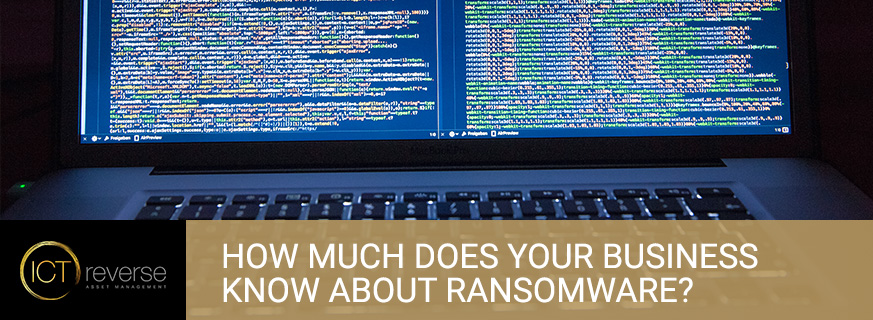How Much Does Your Business Know About Ransomware?

Many, if not all businesses, run with a large involvement or dependency on technology and computers. While the number of companies relying on software and hardware are rising, are they aware of the threats such as Ransomware?
Whether you are an employee or an employer, keeping on top of security threats like these and knowing first and foremost what these attacks involve can help to prevent them and to protect your information. But what really is Ransomware, how can it effect your business, and how can you prevent it?

What is Ransomware?
Computer viruses which encrypt or lock your your files and access information and security details unless you pay a sum of money is commonly known as ransomware. Of all the types of Malware, experts have warned that ransomware is one of the fastest-growing forms of known computer virus.
Like many other technology threats, ransomware usually finds its way onto a device by exploiting a hole in its security, which tricks the user into installing it.
While some simple ransomware locks systems and is not too difficult for a knowledgeable person to fix the problem, other more malicious and advanced malware uses techniques such as crypto viral exertion which encrypts the victim’s files and makes them inaccessible until the individual pays the ransom payment demanded. In a properly implemented attack, to recover the files without a decryption key is an intractable problem that is also difficult to trace and ultimately prosecute.

The Rise of Ransomware
On 12th May 2017, an extremely huge ransomware attack named WannaCry stormed its way through the web and leveraged a vulnerability in Windows OS.
In the first few hours of the cyber-attack, 200,000 machines were infected and companies such as the NHS were crippled.
This was not the only recent attack. Only a few weeks later, a strain of ransomware started spreading through Europe, affecting more companies, including banks and even a monitoring system controlling Chernobyl.
Ransomware has been spreading fast and, lately, it has been the talk of the tech town. In fact, just of lately, security researchers are urging businesses to prepare for these attacks, after the constant discoveries of these malicious cyber-attacks.
On 28th August, less than a month ago and in under 24 hours, more than 23 million emails were sent to millions of computers, all containing malicious attachments and variants of ransomware.
From this, the first port of call was to urge businesses to inform employees of the attack and the association with email attachments. While businesses are always advised to keep a close eye on their emails, attachments, and general computer security, in this time and age employees should pay extra attention, especially if such an attack could seriously impact their business.
From August onwards, ransomware was declared the most popular form of malware, with 68% of all malicious email messages including some sort of ransomware.

How Can You Prevent or Help?
As a business owner, you cannot afford to not be on top of your cyber security and, while the biggest attacks of ransomware are made against businesses, it can also effect individuals. Everyone within a business can play their part to keep the company protected as best as they can:
- The best protection against ransomware is to back up all valuable information and files onto a separate system, such as a hard drive, or something which isn’t connected to the internet.
- Be suspicious of any strange seeming emails, websites, and apps. For any ransomware to work, it needs to be downloaded from malicious software onto a PC, which is used to launch the attack. Always be cautious of opening an unsolicited email which looks unfamiliar or, similarly, of opening an unfamiliar website. Never download an app which you are unsure about.
- Make sure your company is using appropriate antivirus programmes and always install updates onto the staff computer system.
- Never pay the ransom. While this might seem like the quickest and easiest way out, it isn’t. In fact, it can encourage attackers and may not even result in your files being recovered. If you have a backup you don’t need to worry.
Security risks such as ransomware are always a concern within business, so make sure to not only keep your current PCs secure, but your data backed up.

Here at ICT Reverse, we don’t just supply IT audits, data erasure and data transfers, but are proud to say we can shred your data, repair certain devices, and support corporate it disposal. If you require any further information on our services, don’t hesitate to get in touch or speak to one of our expert advisors in regard to data protection.
Click here to see an ICT Reverse internal presentation, in which we discussed the WannaCry outbreak with employees.
